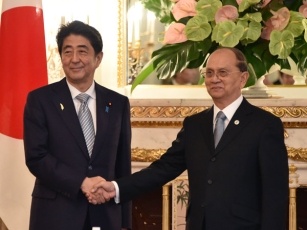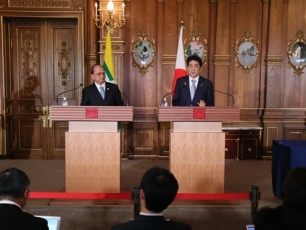Japan-Myanmar Relations
Japan-Myanmar Summit Meeting
 (Photo: Cabinet Public Relations Office)
(Photo: Cabinet Public Relations Office)
 (Photo: Cabinet Public Relations Office)
(Photo: Cabinet Public Relations Office)
On July 4, commencing at 1:50 p.m. for approximately 40 minutes, Mr. Shinzo Abe, Prime Minister of Japan, held a meeting with H.E. Mr. Thein Sein, President of the Republic of the Union of Myanmar, currently visiting Japan to attend the Seventh Mekong-Japan Summit Meeting. The outline of the meeting is as follows.
1. First, Prime Minister Abe expressed his gratitude for Myanmar’s attendance at the Mekong-Japan Summit Meeting, and for its assistance in formulating the New Tokyo Strategy. He commented that both the public and private sectors of Japan intend to continue supporting democratization and social and economic reforms in Myanmar, and would like to provide cooperation for the implementation of free and fair general elections. Prime Minister Abe added that he hopes President Thein Sein will thoroughly enjoy the cultural elements and natural beauty of the regions in Japan he visits. In response, President Thein Sein expressed his gratitude for Japan’s warm hospitality, and offered his congratulations on the success of the Mekong-Japan Summit Meeting. President Thein Sein then conveyed his deepest appreciation with regard to Japan’s support for Myanmar, including its ODAs, and stated that he expects Japan’s further cooperation.
2. Prime Minister Abe stated that Japan, which has existed as a peace-loving nation for 70 years since the end of World War II, will contribute to the peace and stability of the region through its “Proactive Contribution to Peace” initiative; and together with Mr. Yohei Sasakawa, Special Envoy of the Government of Japan for National Reconciliation in Myanmar, will continue to proactively support national reconsolidation between the Myanmar government and ethnic minorities. President Thein Sein pointed out that peace with ethnic minorities is not an issue involving Myanmar alone, but rather one impacting peace worldwide; and he expressed his understanding and support with regard to Japan’s “Proactive Contribution to Peace” initiative. The two leaders decided to promote defense exchanges, including study abroad experiences at the National Defence Academy.
3. Prime Minister Abe stated that Japan will contribute to cultivating industry in Myanmar, developing infrastructure, and the growth of local areas, in line with the existing Japan-Myanmar Joint Initiative and “Industrial Development Vision.” In response, President Thein Sein expressed his appreciation for Japan’s cooperation, mentioning the Thilawa Special Economic Zone and others, and conveyed his hope for Japan’s further assistance.
4. Prime Minister Abe commented that it was recently decided Japan would provide three yen loans totaling approximately 100 billion yen, and that utilizing these funds, Japan intends to assist in the development of the Yangon Circular Railway Line and the East-West Economic Corridor and others, thereby helping to enhance regional connectivity.
President Thein Sein once again expressed his gratitude for Japan’s support.
5. In regard to the memorandum of intent between Japan, Myanmar, and Thailand related to the Dawei development to be signed on this day, the two leaders decided to cooperate between the three countries in the future.
6. The two leaders exchanged opinions concerning regional and international affairs, including South China Sea and North Korea issues, and shared the view to deepen collaboration in the international arena.
7. Following the summit meeting, in the presence of Prime Minister Abe, President Thein Sein, and H.E. Mr. Prayut Chan-o-cha, Prime Minister of the Kingdom of Thailand, Parliamentary Vice-Minister for Foreign Affairs Kazuyuki Nakane, H.E. Mr. Han Sein, Deputy Minister for Transport of the Republic of the Union of Myanmar, and H.E. Mr. Arkhom Termpittayapaisith, Secretary-General of the National Economic and Social Development Board of the Kingdom of Thailand, signed the Memorandum of Intent among the Government of Japan, the Government of the Republic of the Union of Myanmar and the Government of the Kingdom of Thailand, on the Cooperation for the Development of the Dawei SEZ Project.

